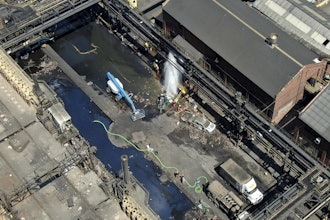
Workplace hygiene is as important as your health and safety plan, meeting deadlines for clients and ensuring the milk in the fridge is always topped up ready for a cuppa. It’s essential to how a workplace is run and perceived by its employees.
Poor workplace hygiene can lead a number of issues, including a high staff turnover, increased sickness and even accidents such as slips and trips. Let’s explore these consequences further, and how you can ensure your workplace is as hygienic as possible.
Illness
Workplace bugs are quick to spread in an office space that doesn’t take hygiene seriously. Sure, your cleaner might come in once a week, but if people’s desks aren’t cleaned properly and regularly they’re going to harbor germs — and in turn this can spread viruses and bacteria much more easily.
Regular occurring illness results in people taking days off, which leads to a loss of productivity and even income and reputability for the company. In 2016, 137m working days were lost to illness — that’s a high amount of working time missing from UK businesses and something that can be reduced with good workplace hygiene.
What to do: Have anti-bacterial gel available for everyone, as well as easy-to-use cleaning wipes so people can give their workspaces a regular once-over. Ensure bins are emptied regularly and mugs and cutlery thoroughly cleaned each day.
Slips And Trips
Poor workplace hygiene will lead to spillages and mess not being cleaned immediately after it is made, which can lead to potential hazards appearing around a workplace. People may end up slipping or tripping on these — such as water spilt on a tiled floor in the kitchen — and injuring themselves. Slips and trips make up for around 40 percent of workplace accidents, so this is something to be particularly mindful of.
Not only does this mean an accident has occurred which needs recording but it also causes a headache for the company from a legal perspective if the employee decides to take action against the company.
What to do: Encourage staff to clean up after spillages and offer easy access to products such as paper in dispensers that can be used to quickly wipe up mess.
High Staff Turnover
If your staff don’t believe you are taking enough care of the workplace and that hygiene is an issue, it’s likely they won’t be happy and will potentially start to look for another employer. If this goes on for too long, you could see your staff turnover increase which is something no business wants to see.
What to do: Make an effort to encourage a strong workplace hygiene ethic, incentivizing cleaning and ensuring people understand the importance of keeping the workplace in good order. You could also look into employing an extra cleaner to tackle those bigger jobs and ensure dirt doesn’t build up in forgotten places — such as under desks or on shelving.
Workplace hygiene ensures you have happy staff and an environment free of infection or contamination. It improves mood, encourages productivity and keeps staff content within their roles.
Patrick Vernon is a freelance writer, specializing in business and finance related content. Patrick has gained experience writing for a variety of magazines and websites, researching and offering his advice on business tips to the public."























